New release of GitLab 11.4 with review of merge requests and checkboxes of functions
- Transfer
We are pleased to announce the release of GitLab 11.4 with incredible updates designed to help development teams work together more effectively. Most development teams implementing the DevOps concept tend to shorten the cycle time. Therefore, such improvements are welcomed, which reduce time losses and unnecessary work, and thus make it possible to speed up the delivery of applications and achieve better business results.
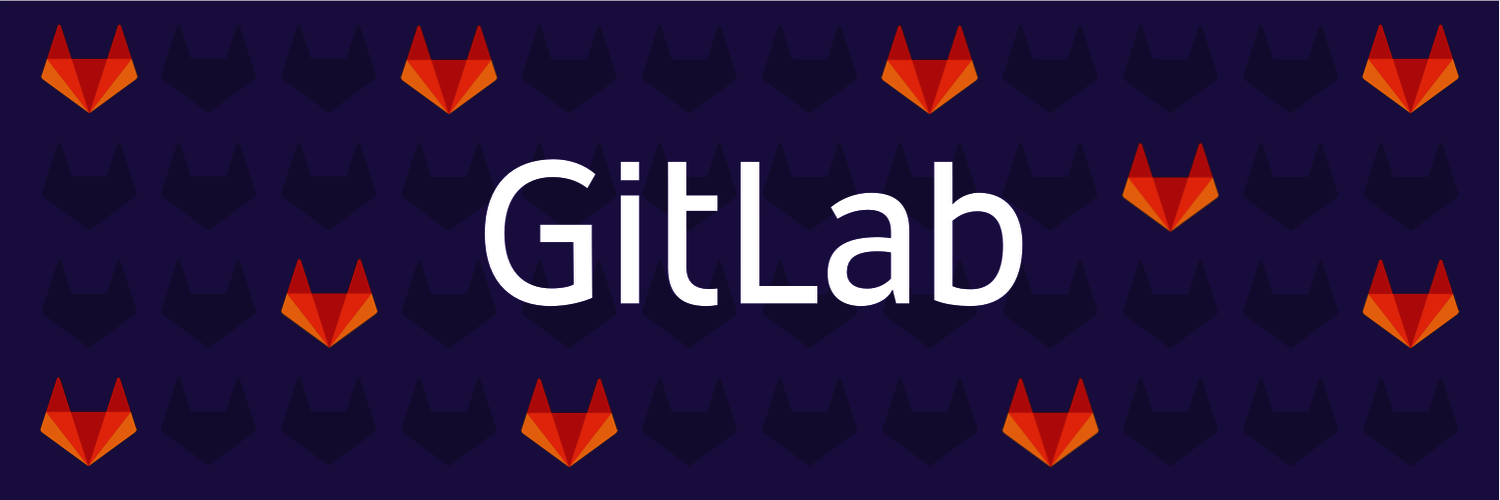
With the release of GitLab 11.4, code review has been improved using tools such as merge request reviews and the file tree in the list of differences . A new feature, feature flags, is proposed (alpha version). The Auto DevOps and CI conveyors are even more efficient because they now have the ability to migrate the PostgreSQL database and incremental scheduling . Git itself has become even faster with the advent of support for the Git v2 protocol .
Code Review
The " merge request review " tool will reduce the chaos of numerous comments on the code and merge requests. The batch comment feature allows the reviewer to enter multiple comments on a code or merge request, and then finalize them and send them in one batch. Now, those who subscribe to this project can more effectively track changes.
In order for a high quality code to be delivered, it is necessary that the changes are reviewed and approved by the persons most suitable for this purpose. In release 11.3 , the concept of “code owner” was introduced. Now, based on a file CODEOWNERSthat contains information about the owners of the code, GitLab suggests those individuals who must review and approve a specific merge request. Thus, it is possible to review and approve changes quickly and at minimal cost. This is also useful in determining the separation of responsibilities and roles in a team when it is necessary to define reviewers for specific parts of the code.
When reviewing merge requests, you can now view the file tree. For reviewers, it simplifies and speeds up navigation between several modified files, and they can leave relevant comments and comments.
Russell Levy, co-founder and CTO of Chorus.ai , explains how the review and tree functions help their team:
We approach the review of the code quite thoroughly, and usually each request for a medium-sized merge has 10–20 comments, as well as several rounds of discussions. Using the review function reduces chaos and delays in the review process.
When working on the largest merge requests, the new feature “tree of files in the list of differences” significantly speeds up the review, because with its help you can easily navigate through the code to understand the dependencies.
Function flags
We present an alpha version of " flags of functions » (feature flags), turn on the system and disable the functionality of the application. Development teams can now practice a continuous supply of applications, deploying new features in a production environment in small packages and reducing the risk before performing a full deployment.
Auto DevOps and CI / CD Conveyors
We also provided all users with the ability в своих файлах .gitlab-ci.yml команды includeto use additional files to connect. Now it is available not only in the Starter version, but also in the Core. This enables all teams to use this best practice and makes managing the CI / CD pipelines easier and more efficient.
Pleasant cosmetic changes
Together with the wider community of GitLab, there have been additionally many great improvements that we have included in this release. These include: new profile layout, quick access to profile status, highlighting comments @mentions, new quick actions and the ability to close epics.
Read on and you'll learn even more about all the great features in the GitLab 11.4 release.
The most valuable person of this month ( MVP ) is Luc Piccio .
Luke added the ability to download recovery codes 2FA as a file , which simplifies their backup. 2FA recovery codes are required to restore access to your GitLab account if you lose access to your phone or one-time secret password.
Thank you, Luke, for your contribution!
Key features added to the GitLab 11.4 release
Reviewing merge requests
Available in versions: PREMIUM, ULTIMATE, SILVER, GOLD
Code review in merge requests is a powerful feature in GitLab. Team members enter into dialogs related to specific lines of code in the list of differences, and may even resolve inconsistencies that may arise. However, if the differences are large in a specific merger request, the process can become quite confusing. Often, reviewers may need to leave 10 or more comments during one dialogue cycle. And it may be that the 9th or 10th comment makes earlier comments unnecessary. The end result is that the author of a merge request receives many notifications and must sort them one by one.
In this release, we present the ability to review merge requests. This will allow the reviewer to create as many draft code comments as they wish in the merge request, make sure that they are all consistent, and then send them in one go. Because drafts of comments are saved in GitLab, the reviewer can even distribute his work into several sessions. He may, for example, start a review on his desktop computer during office hours, and then later in the evening form a final review on his home tablet device. As soon as drafts of comments are sent, they take the form of ordinary individual comments. This allows individual team members to review the code in the order in which it is more convenient for them, but at the same time maintain compatibility with the entire team.
In future iterations, we will improve this feature by providing a preview before executing the batch dispatch , and also combine all those notifications that are currently generated based on these comments into one batch notification .

Creating and switching feature flags (applications flags) (alpha version)
Available in: PREMIUM, ULTIMATE, SILVER, GOLD
This feature allows you to create checkboxes for functions and control the capabilities of your software directly in the product itself. Simply create a new checkbox of the function, check it in your program using simple API instructions, and you will be able to control the behavior of the program in the production environment from inside the GitLab itself.
Function flags are a system for enabling and disabling the functionality of your application. They allow teams to perform uninterrupted delivery by deploying new components in a production environment in small batches so that the testing process can be monitored. Delivery of components is separated in time from their launch by the customer. This helps to reduce the risk and allows you to easily manage the on and off of certain functions.
Please note that this is an alpha function that is introduced for the first time, so we recommend that you check this function and provide feedback, and also notify you that its implementation may change in future releases.

File tree to view merge request differences
Available in: CORE, STARTER, PREMIUM, ULTIMATE, FREE, BRONZE, SILVER, GOLD
Code review is an important technique used in every successful project, but it is difficult to understand from the unstructured list of differences what exactly has changed. GitLab now has a searchable file tree with which you can see which files have changed and go from one to another.
In the file tree, similarly diff-stats, the structure and size of changes is displayed. With it, it is more convenient to view the changes and move from one difference to another. Searching the tree allows reviewers to limit code viewing to a specific subset of files by specifying a specific path or file type. This simplifies the review for those professionals who focus only on a specific subset of files from a merge request.
Previously, a list of modified files was available through a searchable drop-down list, which was most convenient for navigating to a specific file.
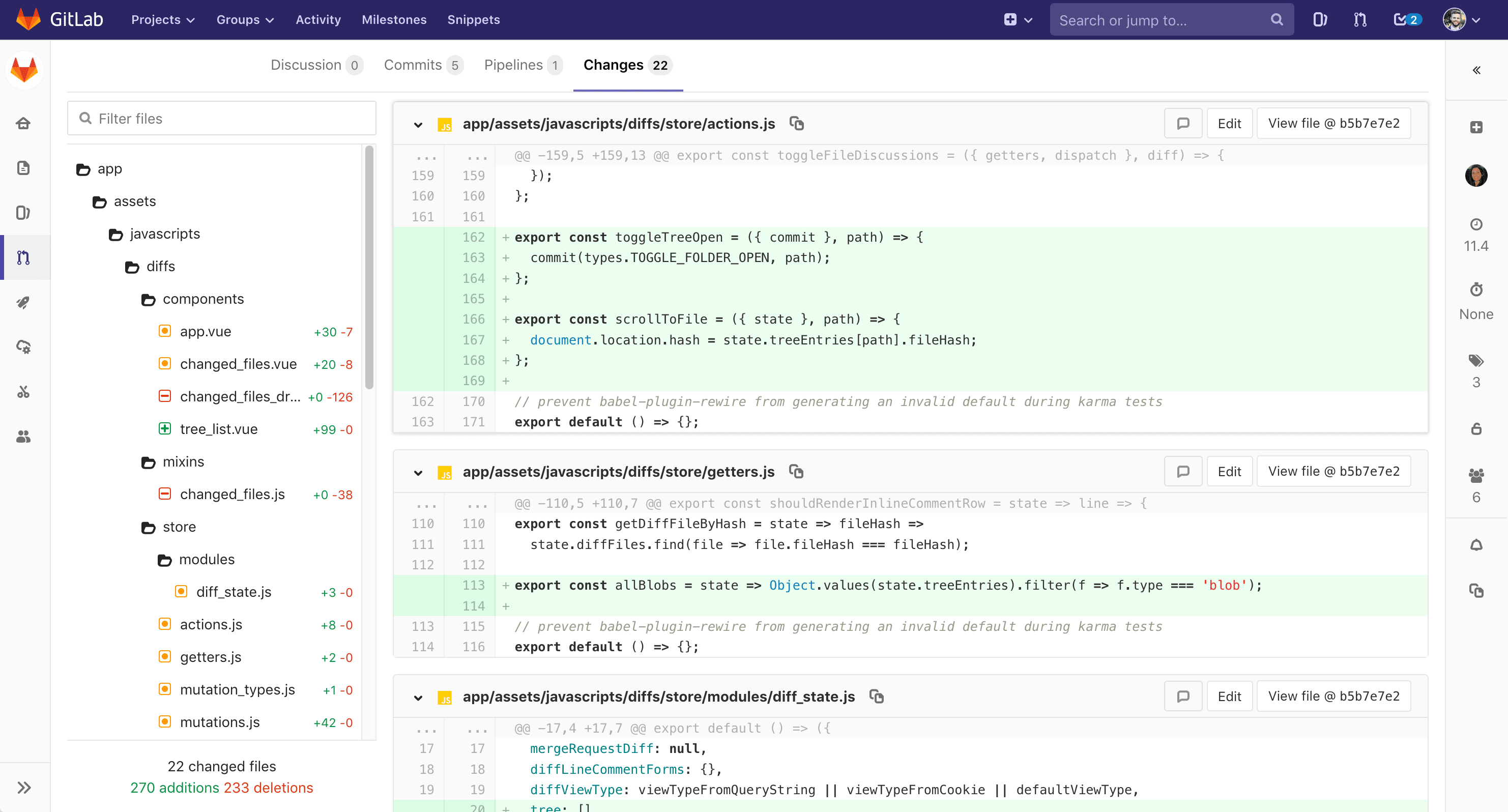
Ability to offer code owners as approvers
Available in: STARTER, PREMIUM, ULTIMATE, BRONZE, SILVER, GOLD
It is not always obvious who is the most suitable person to review code changes. Now when creating or editing a merge request, the owners of the code are specified as the persons recommended for approval of the request. This simplifies the appointment of the right person.
Support for identifying code owners was introduced in the GitLab 11.3 release . In subsequent releases in the workflow of a merge request, the degree of participation of code owners will increase. For this purpose, automatic assignment functions and requirements for approval by the owner will be provided .
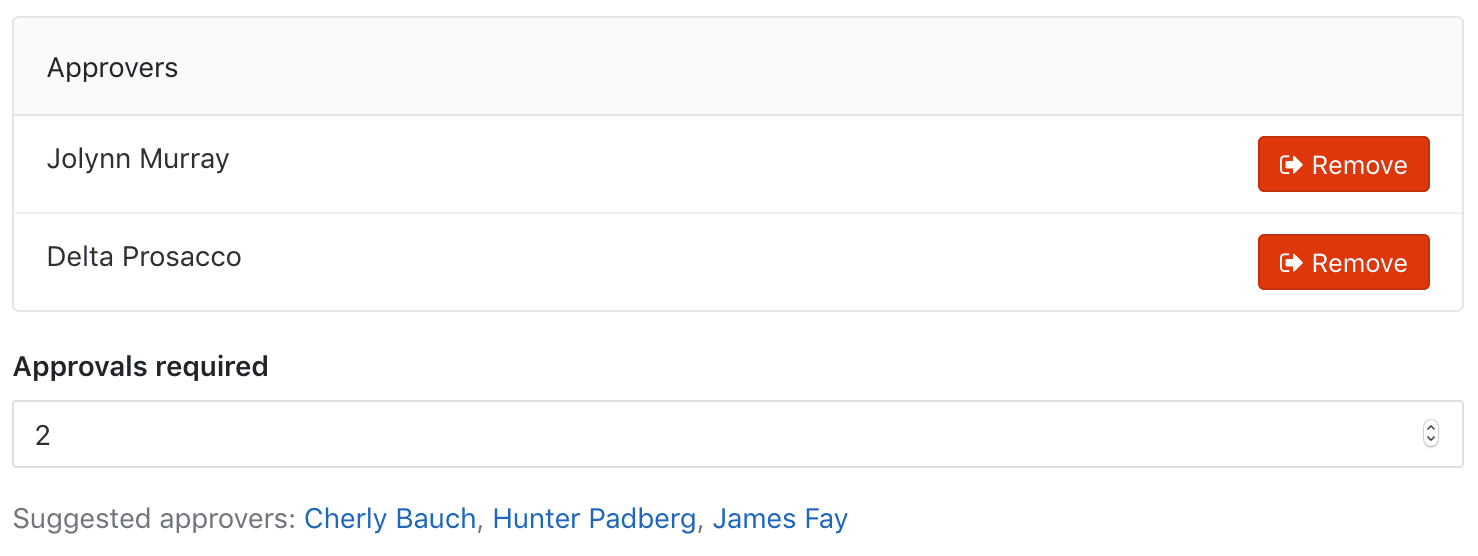
Update the appearance of the user profile page
Available in: CORE, STARTER, PREMIUM, ULTIMATE, FREE, BRONZE, SILVER, GOLD
No matter how involved you are in GitLab, your activity is a significant source of information and an indicator of participation, which is displayed directly on your personal profile page. Your personal profile should give a simple idea of what you are interested in and what you are working on.
In this issue, we present an updated look and feel of the profile page, reflecting your activities through a previously familiar, but now abbreviated, personal contribution schedule. The page also shows your recent activities and the most significant personal projects in GitLab.
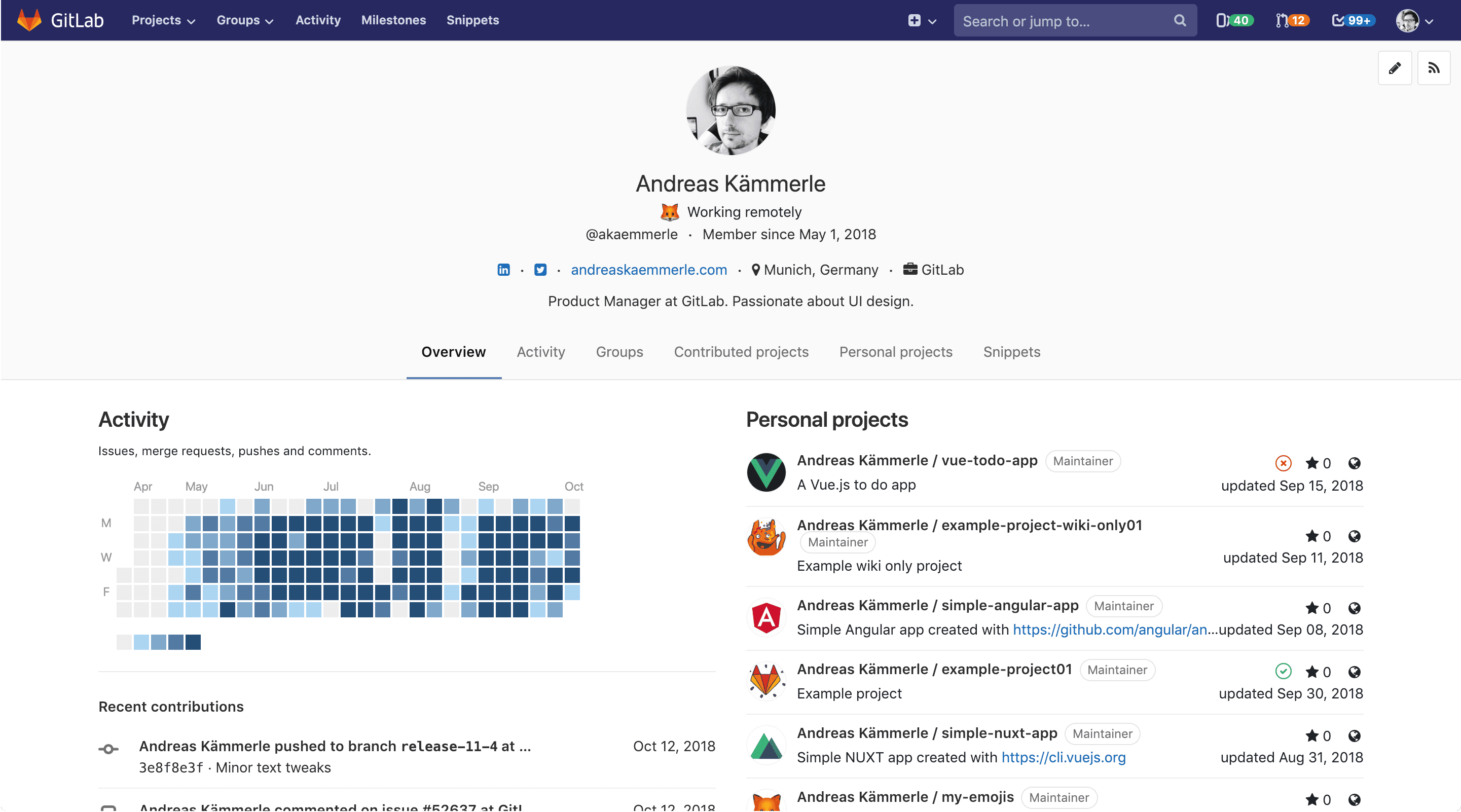
Setting and displaying the status in the user menu
Available in: CORE, STARTER, PREMIUM, ULTIMATE, FREE, BRONZE, SILVER, GOLD
In the release of GitLab 11.2, we first introduced personal status messages that allow you to display your accessibility or mood at the moment or simply to place an image of your favorite animal.
In this release, the status setting has become even simpler and smoother. When a new item “Set status” is selected in the user menu, a new modal window appears with which you can set and reset your status right in the context. In addition, the status you set is displayed in your user menu, on top of your full name and username, including the emoticon and message set.
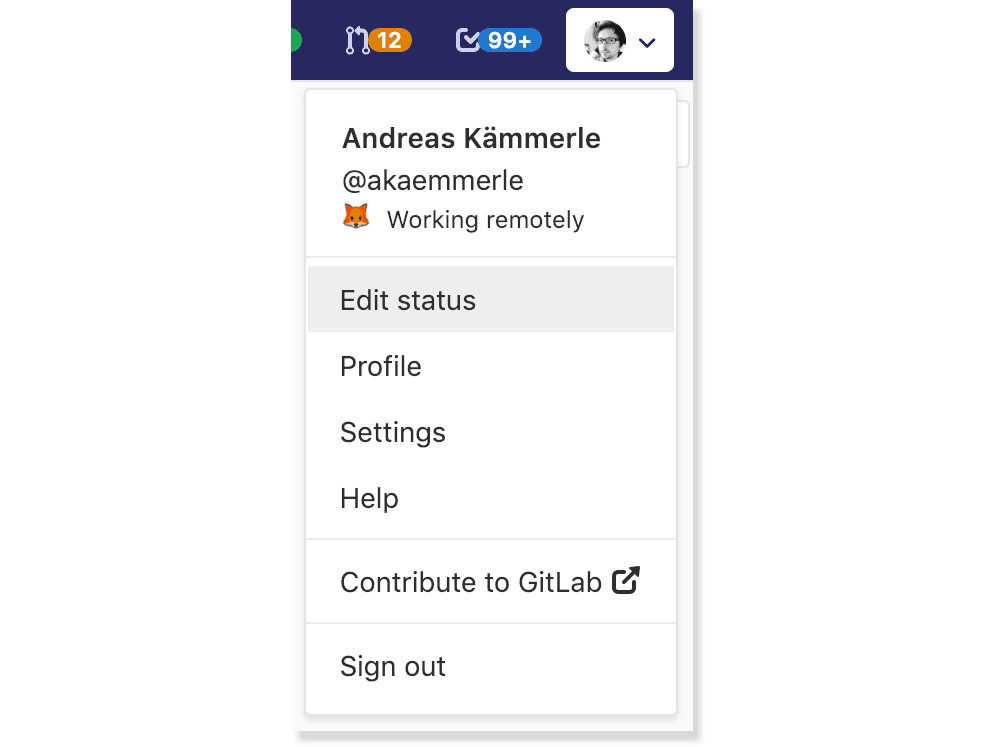
The ability to use Include has .gitlab-ci.ymlpassed from Starter to Core
Available in: CORE, STARTER, PREMIUM, ULTIMATE, FREE, BRONZE, SILVER, GOLD
We are pleased to announce that, starting with this release, the use of the "include" operator in files .gitlab-ci.ymlis now available in the Core version. This will help ensure compatibility of templates and other common resources for users of free and paid versions of GitLab, as well as open up the possibility for all users to develop advanced methods using reusable code fragments in CI / CD pipelines.

Run tasks only/ exceptfor changes in a specific path or in a specific file
Available in: CORE, STARTER, PREMIUM, ULTIMATE, FREE, BRONZE, SILVER, GOLD
The need for such a function is often stated in user requests. We are proud to offer the ability to use .gitlab-ci.ymlrules only/ exceptfor tasks in files in which changes occur in a specific file or along a certain (global) path.
This will provide additional control for users whose repositories contain different types of resources (assets) or assemblies. It is guaranteed that for the types of changes that have been made, only the corresponding steps will be performed; thereby reducing the overall execution time of the pipeline.

Incremental scheduled deployments added to Auto DevOps pipeline
Available in: PREMIUM, ULTIMATE, SILVER, GOLD
In earlier releases, it was already possible to configure incremental deployments in Auto DevOps, and in this version we added a parameter that allows you to configure incremental deployments on a schedule . Deployment will automatically continue along a timeline until an error occurs.

Kubernetes RBAC Support for GitLab-Developed Applications
Available in: CORE, STARTER, PREMIUM, ULTIMATE, FREE, BRONZE, SILVER, GOLD
When you first set up your infrastructure or connect to an existing one, security becomes paramount. Role-based access control (RBAC) has become widely available as part of the release of Kubernetes 1.8, providing more detailed means of controlling access to Kubernetes resources.
Now GitLab integration with Kubernetes allows you to either create a cluster with RBAC support in the GKE, or connect to an existing cluster with RBAC support. At the same time, enhanced infrastructure security is provided.
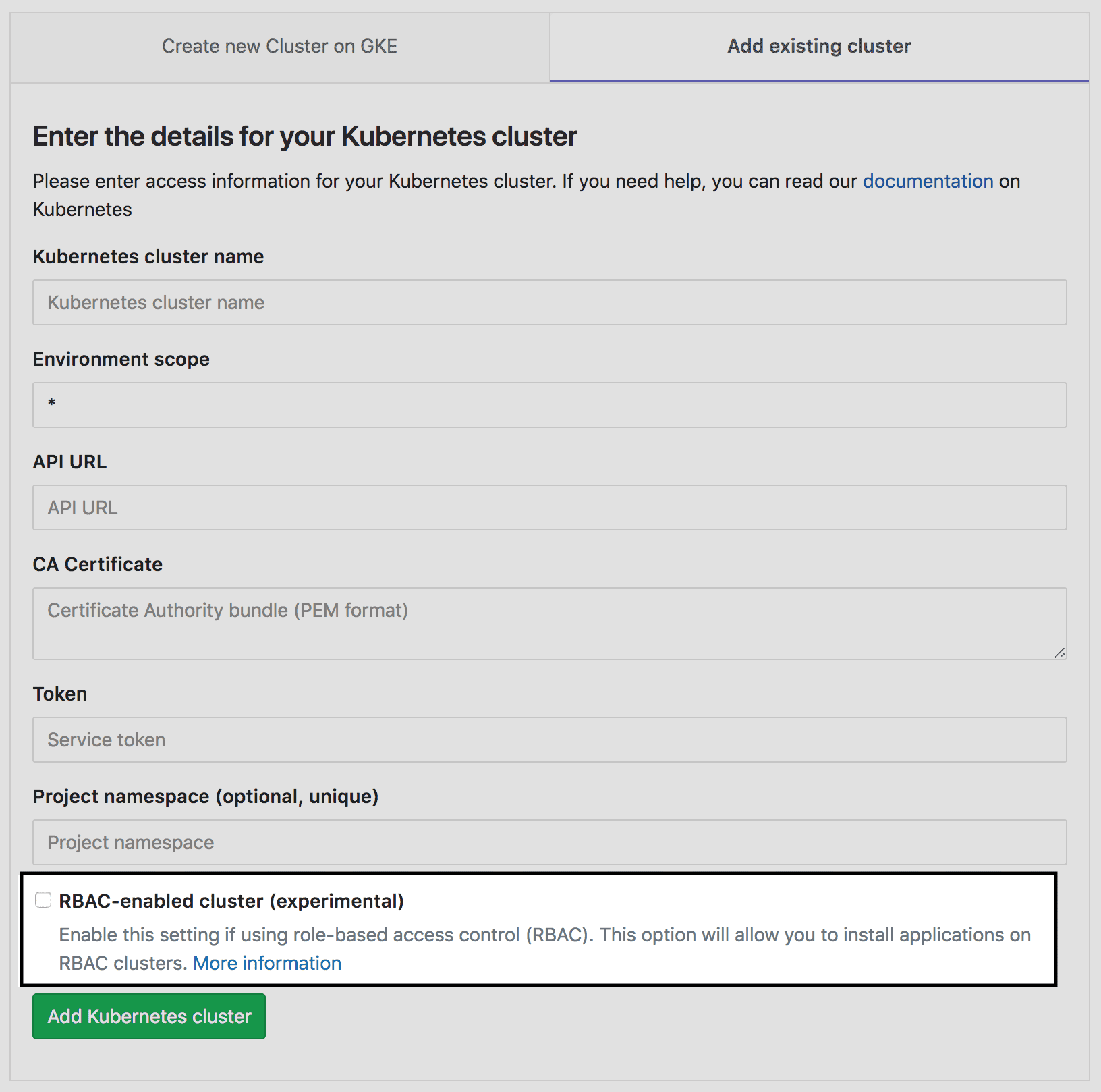
RBAC support in the Auto DevOps pipeline
Available in: CORE, STARTER, PREMIUM, ULTIMATE, FREE, BRONZE, SILVER, GOLD
Auto DevOps now supports interacting with RBAC clusters with RBAC support and deploying applications to them.
Role Based Access Control (RBAC) is an important tool that allows operators to ensure the reliability, security and efficiency of their Kubernetes cluster. Using Auto DevOps in conjunction with an RBAC-enabled cluster ensures that your applications take advantage of the enhanced security of the infrastructure.
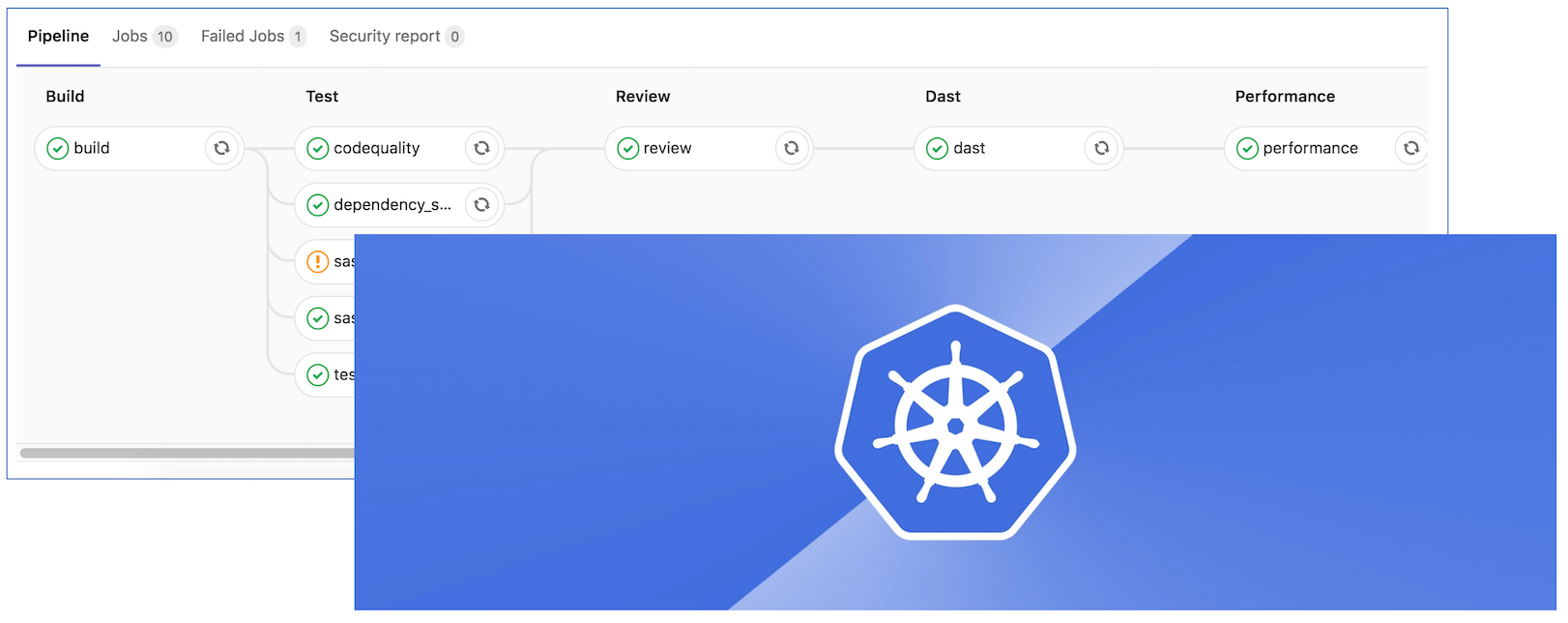
PostgreSQL for Auto DevOps database migration and initialization support
Available in: CORE, STARTER, PREMIUM, ULTIMATE, FREE, BRONZE, SILVER, GOLD
When using Auto DevOps to automatically detect, build, test, deploy, and monitor your application, additional features have appeared. Starting with release 11.4, Auto DevOps provides the ability to initialize or migrate a PostgreSQL database to your project.
Simply define a project variable to initialize or migrate your PostgreSQL database, and Auto DevOps does the rest.

Other improvements in GitLab 11.4
Lists of tags for which notifications are signed by the user
Available in: CORE, STARTER, PREMIUM, ULTIMATE, FREE, BRONZE, SILVER, GOLD
Labels in GitLab are a very powerful tool, as they can be applied to issues (issues), merge requests and epics. The more tags you use, the harder it may be to support them.
In the previous issue, we added the ability to search for tags on the project tag list page. In this release, you can search by tags, sort tags by name, date created and date updated, and even see a list of tags that you are subscribed to. This feature is available on the tag list pages for both the group and the project.

WIP Merge Request Filtering
Available in: CORE, STARTER, PREMIUM, ULTIMATE, FREE, BRONZE, SILVER, GOLD
Merge requests are the main part of GitLab; they provide team members with transparent collaboration in code development. In particular, we encourage teams to share their work early. In this case, it is advisable to use the WIP function (work in progress) to indicate that this merging request is still under active work, and at this stage it should not be executed yet.
In this release, it will be easier for users to distinguish between requests for merging WIP and non-WIP thanks to a specially designed filter that is applicable to lists of merge requests both at the group level and at the project level. This allows users to focus on those requests that are still at an early stage of work, and not on those that are in the final stage of review before merging.
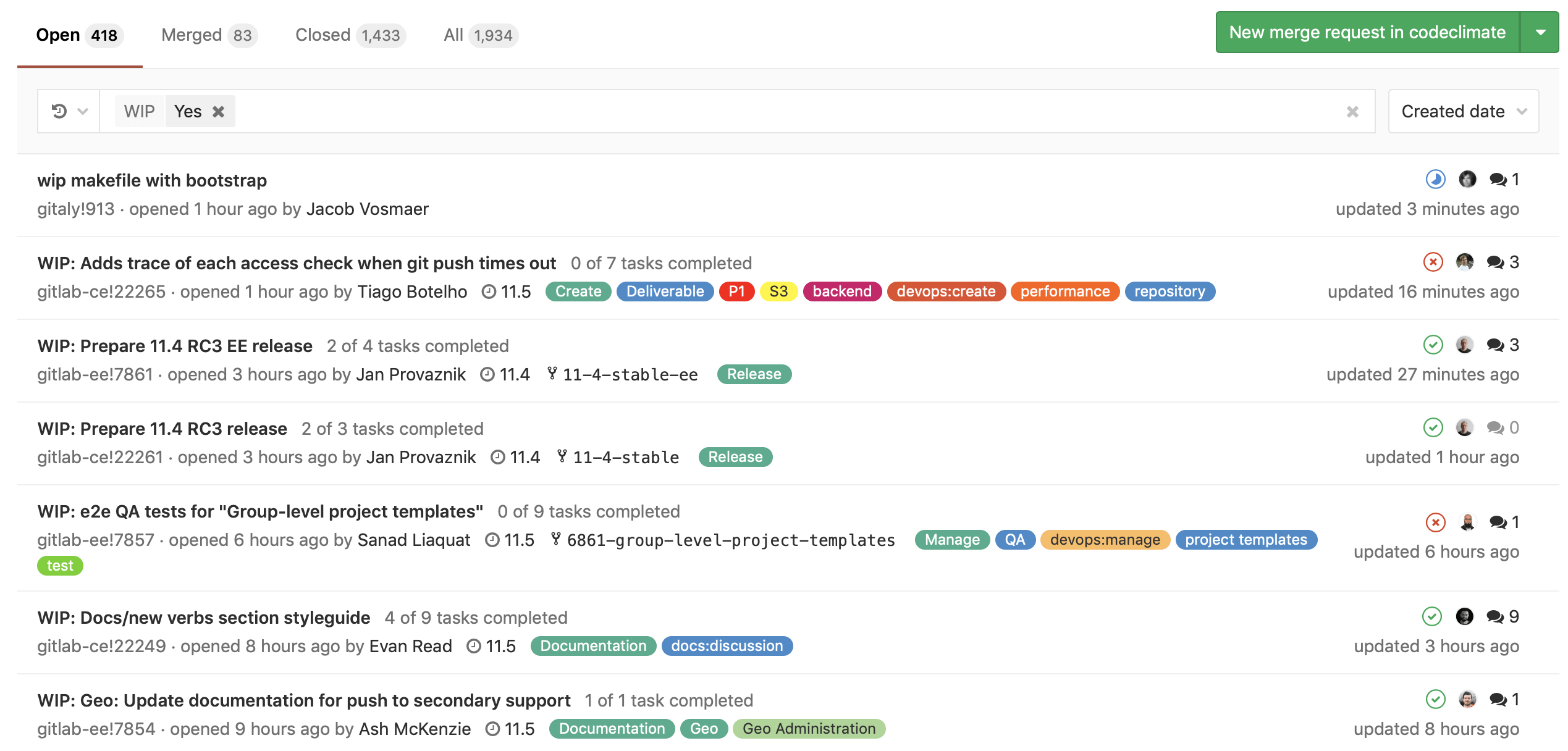
Clear selection @mentionsfor current user
Available in: CORE, STARTER, PREMIUM, ULTIMATE, FREE, BRONZE, SILVER, GOLD
A lengthy joint discussion of a problem or a merge request often involves many users, which makes it difficult to quickly view comments directed specifically to you.
Starting with this release, comments ( @mentions) sent to you (that is, the current user) are highlighted in a special color. This allows you to see which comments are related to you, and helps you quickly focus on them.
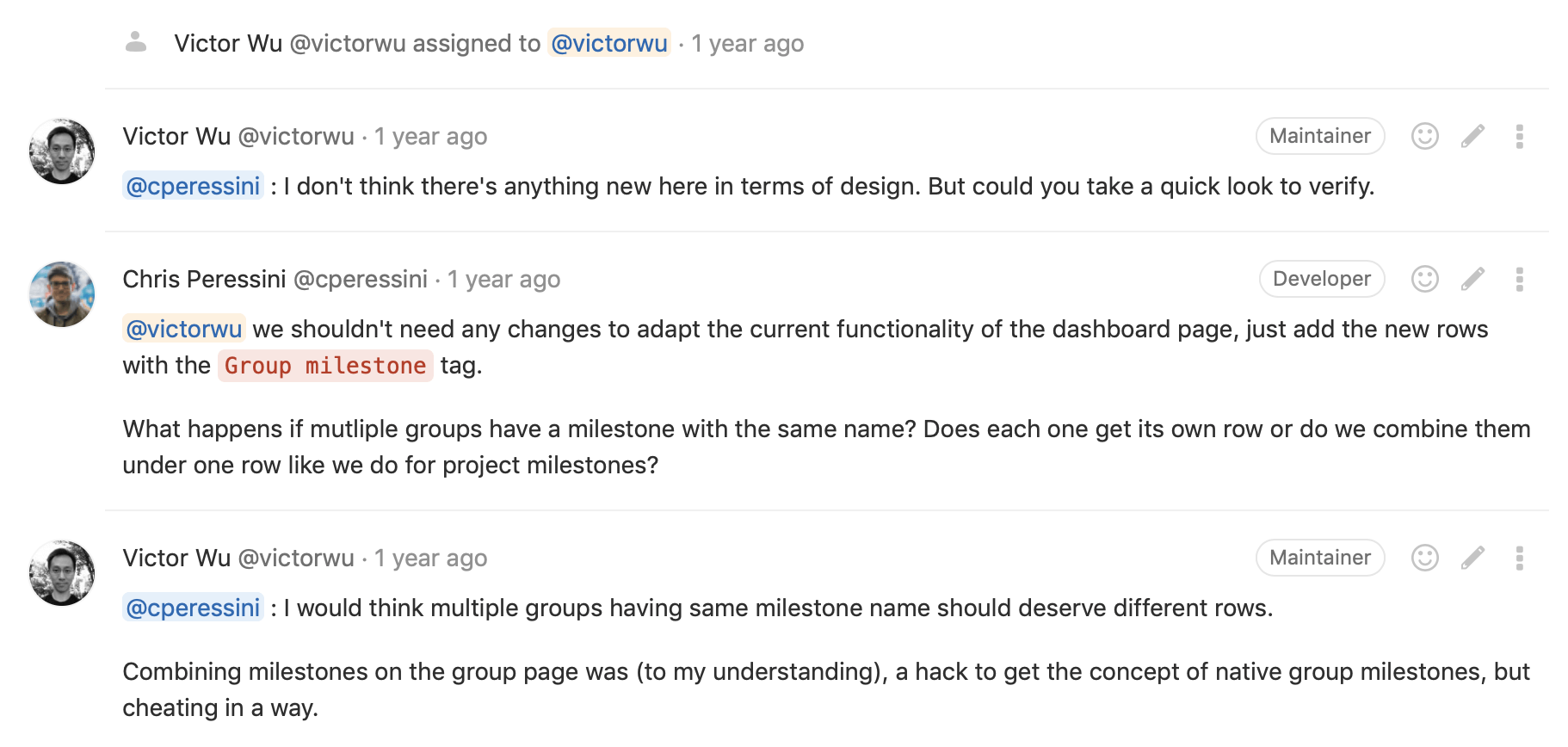
Insert tables and links at the touch of a button
Available in: CORE, STARTER, PREMIUM, ULTIMATE, FREE, BRONZE, SILVER, GOLD
GitLab supports the use of GitLab Flavored Markdown (GFM) markup tools in most cases when working in GitLab in which you have to enter text. GFM combines powerful formatting with a simple syntax. In particular, with the help of GFM you can create tables. Previously, this was difficult, especially for large tables, since you had to enter many characters or insert the previous table in order to format it according to your needs. GFM also supports URL insertion. But sometimes you can forget the specific syntax.
Starting with this release, you can click on the table button in the GFM editor, and a new table will automatically be added. Then you can easily enter values or expand the table and format it as you need. You can use this feature in descriptions and comments throughout GitLab.
Now you can click the link button, and a skeleton of URL link syntax will be created for you. You can easily put a link there and write down her name.
Thanks to George Tsiolis for the ability to insert tables!
Thanks to Jan Beckmann for the ability to insert URL links!
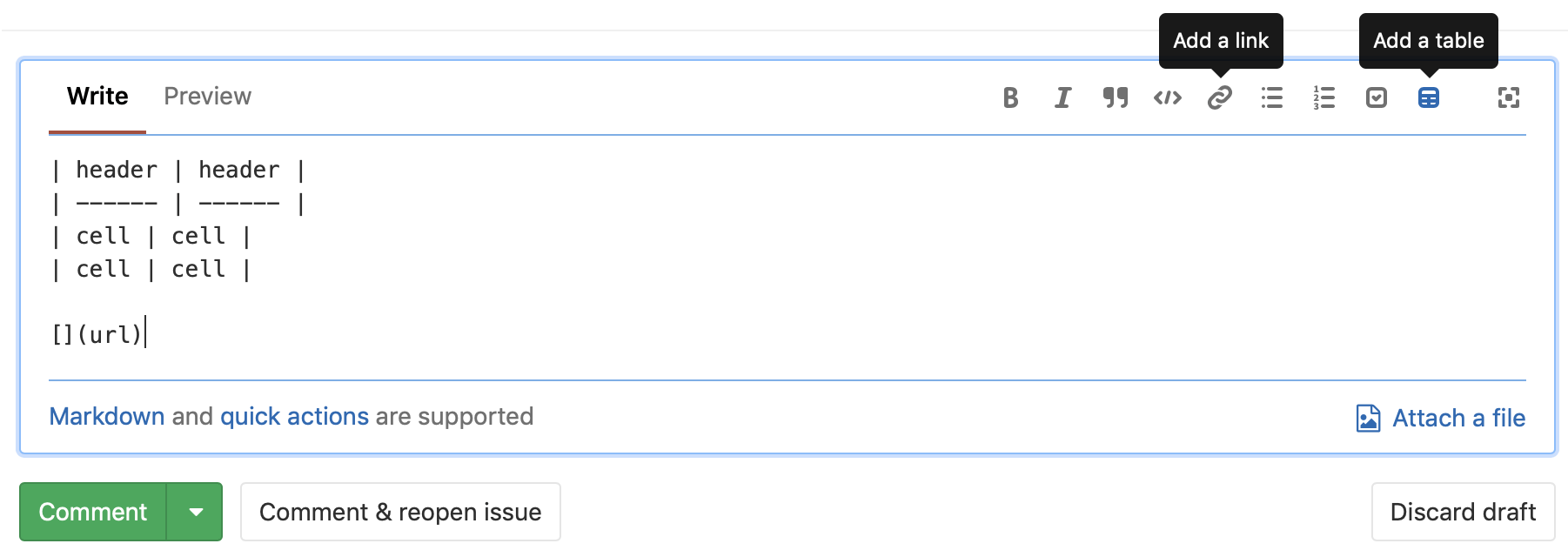
Inclusion of new problems in the work schedule
Available in: STARTER, PREMIUM, ULTIMATE, BRONZE, SILVER, GOLD
Work schedules help teams keep track of work as it progresses within the work phase. Usually the amount of work is determined and agreed before the start of the stage. But sometimes there may be important exceptions to this rule (for example, an error that caused an emergency or a fix for security), and a new amount of work in the form of new issues should be added to the schedule.
In this release, new problems arising during the work and resulting in a jump in the line will now be taken into account in the schedules of the tasks.
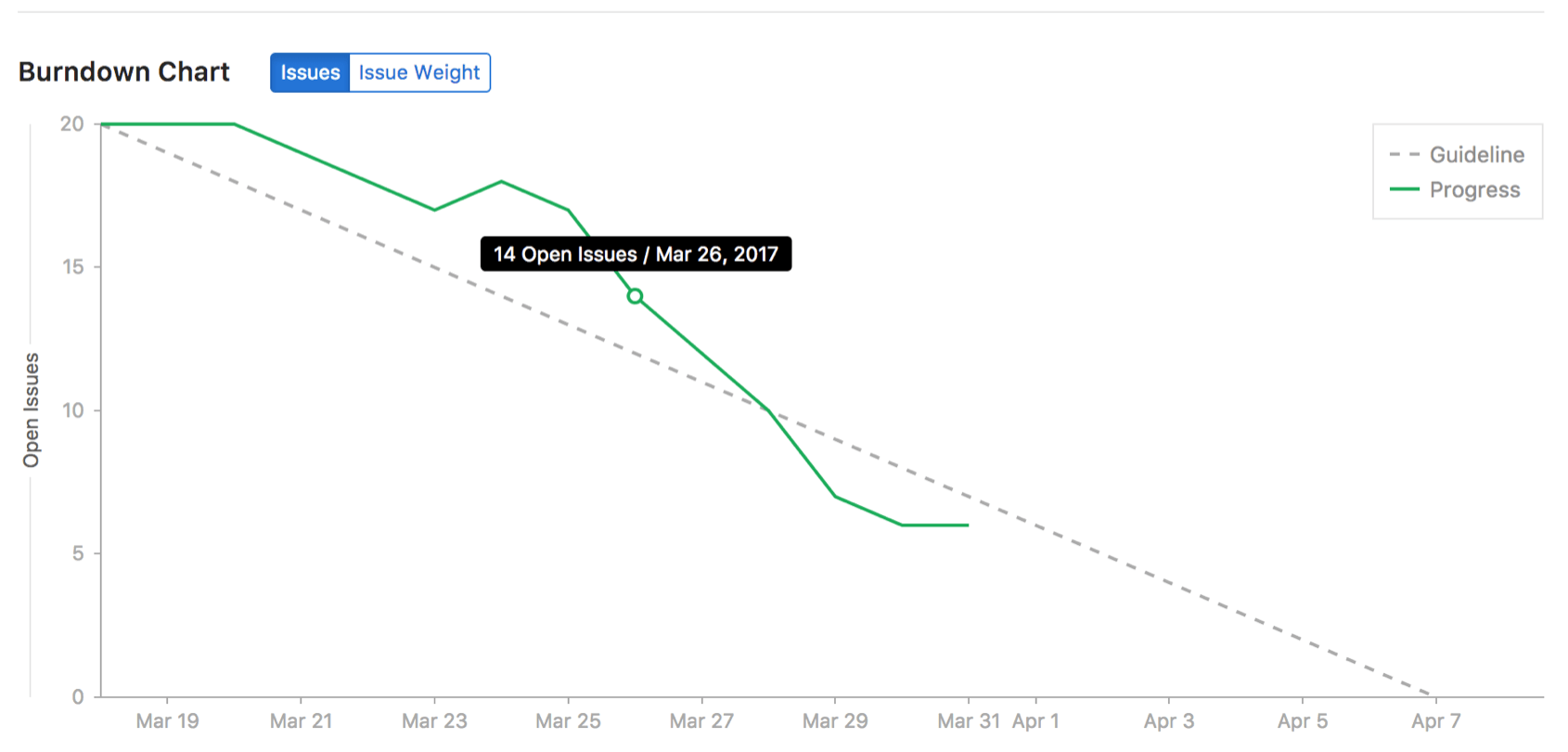
Extended weight values in API publications
Available in: STARTER, PREMIUM, ULTIMATE, BRONZE, SILVER, GOLD
In the previous release, we expanded the allowable weight values of the publication, which can now be almost anything if it is greater than zero.
We also made API publishing more flexible, so that users can fill this field with a wider range of numbers using the API.
Quick action "blocking discussions"
Available in: CORE, STARTER, PREMIUM, ULTIMATE, FREE, BRONZE, SILVER, GOLD
Blocking discussions in release requests or publications can help direct the discussion to new publications (or join requests). It can also be used to prevent insults or any other unproductive behavior.
In this release, a new quick action appeared to lock and unlock discussions, which simplifies entering comments and allows you to lock / unlock with a single action.
Thanks to Mehdi Lahmam for the contribution!
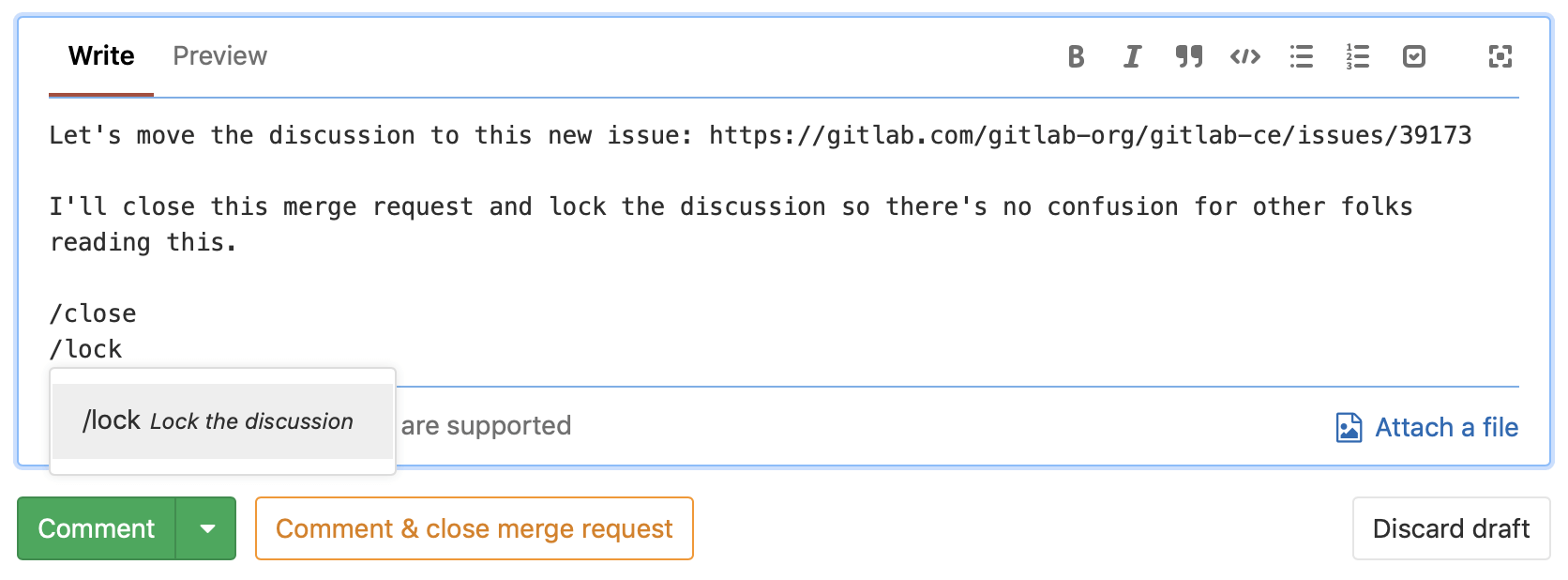
Epic closure
Available in: ULTIMATE, GOLD
You can, in a manner similar to merge requests and publications, close (and reopen) epics in GitLab. In the list of epics, there are now tabs "Open", "Closed" and "All", as well as in the publication. Therefore, if you have completed all the work in the epic, or it is no longer relevant, you can close it, and it will no longer appear in the list by default.
You can close (and reopen) the epic using the buttons contained in the epic, quick action in the commentary to the epic or through the API, as is the case with the publication.
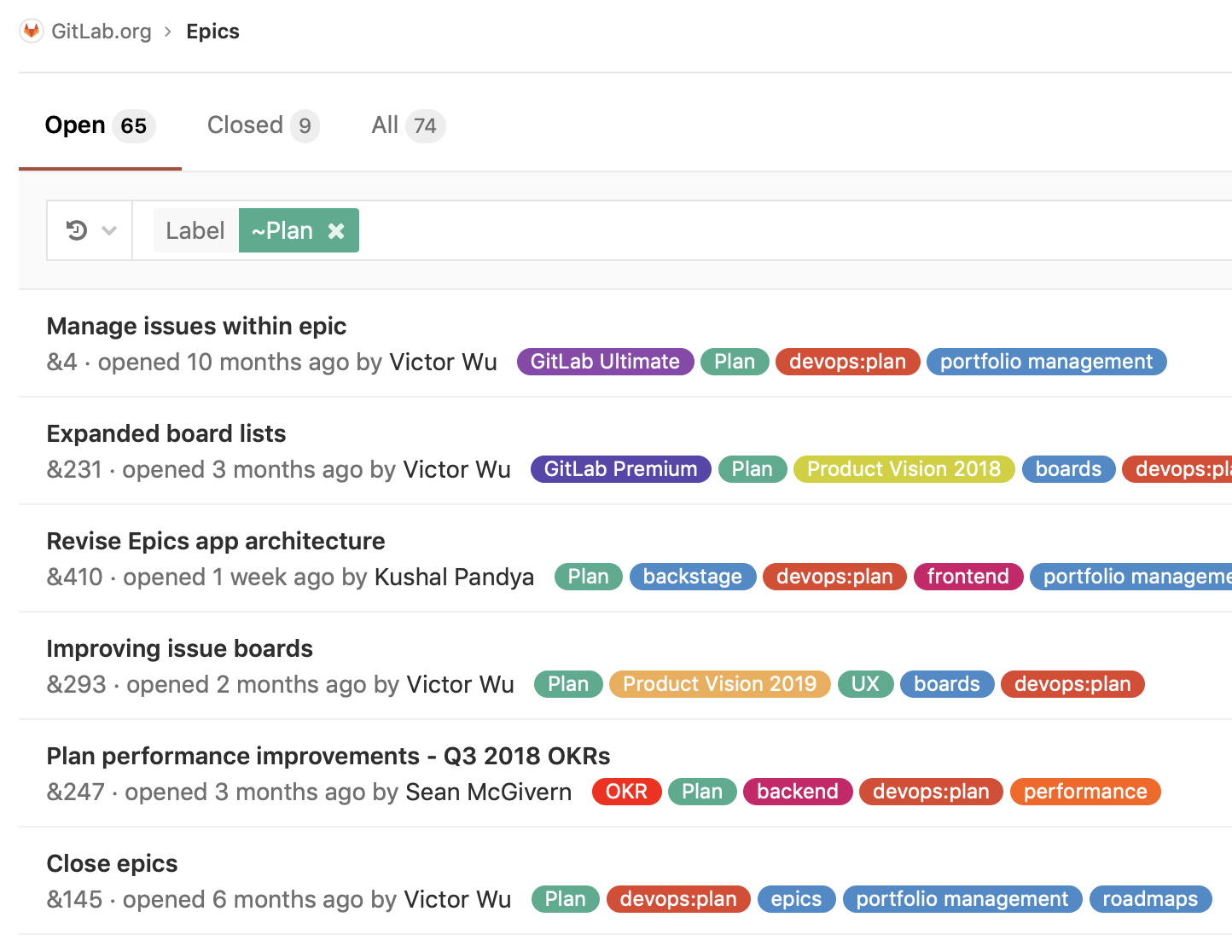
Improved admin settings panel structure
Available in: CORE, STARTER, PREMIUM, ULTIMATE
Depending on your responsibilities, the task of administering GitLab can become very difficult due to the large number of functions in GitLab.
In this release, we have made the admin settings panel more convenient by moving all sections on the new individual sub-settings page. Thus, the administrator will save time, as he will have quick access to any control details.
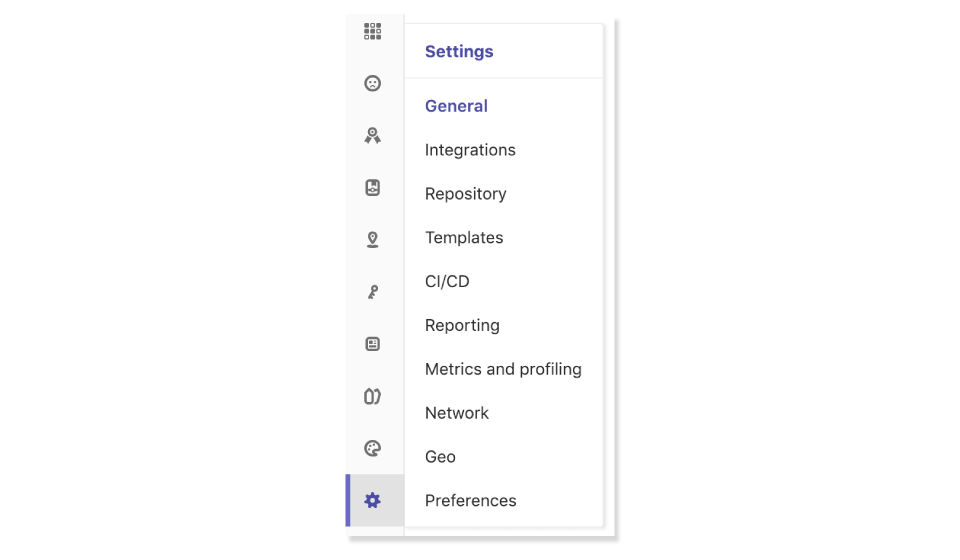
View projects by popularity
Available in: CORE, STARTER, PREMIUM, ULTIMATE, FREE, BRONZE, SILVER, GOLD
We do our best so that you can always find interesting and useful projects in your GitLab instance. In the new release, we added the filter “Highest rating” - an extremely useful filter, with which you can see in your copy the projects that received the highest rating.
We thank Jacopo Beschi for this contribution!
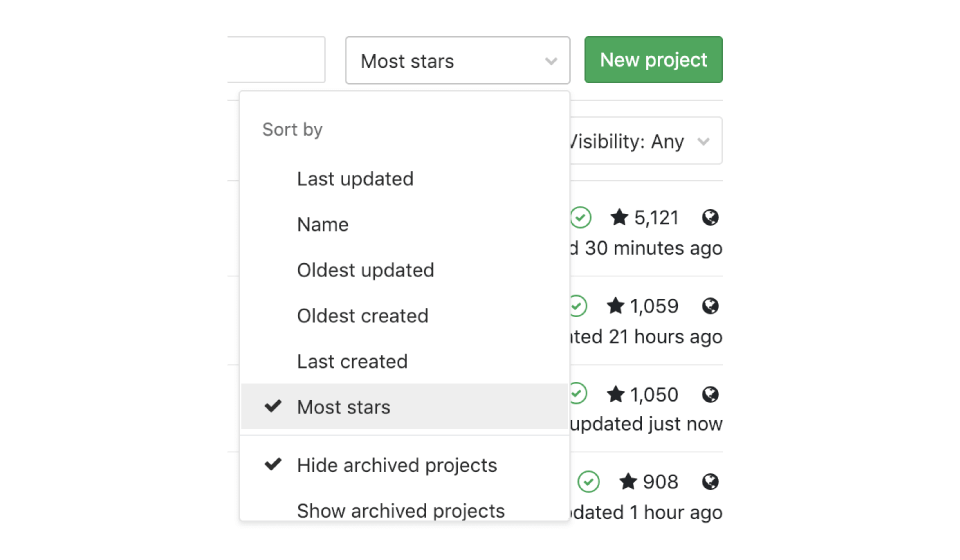
Displaying the percentage of code content in a specific language in a project preview
Available in: CORE, STARTER, PREMIUM, ULTIMATE, FREE, BRONZE, SILVER, GOLD
We recently added a new panel for the code language on the project preview page, which provides a brief overview of the programming languages used in the project.
In GitLab 11.4, we added another indicator that displays the percentage of the code for the corresponding programming languages. Thus, you can more clearly see the quantitative indicators of a set of technologies involved in your project.
Thank you for this contribution of Johann Hyubert Sonntagbauer !

Download two-factor recovery code
Available in: CORE, STARTER, PREMIUM, ULTIMATE, FREE, BRONZE, SILVER, GOLD
Two-factor authentication is actually the standard login method of any modern web application. We understand and take it seriously. When you install two-factor authentication for the first time, we provide you with a limited set of recovery codes with which you can regain access to your account if you cannot log in using the usual method.
This release now supports downloading recovery codes as a text file using the “Download codes” button.
We thank Luca Pichio for his contribution to the development of the service!

Filter by type and state of the runner in the admin runner viewer
Available in: CORE, STARTER, PREMIUM, ULTIMATE
In the admin runner viewer window, you can now filter runners by type and state, thereby providing more options for managing a particularly large set of runners.
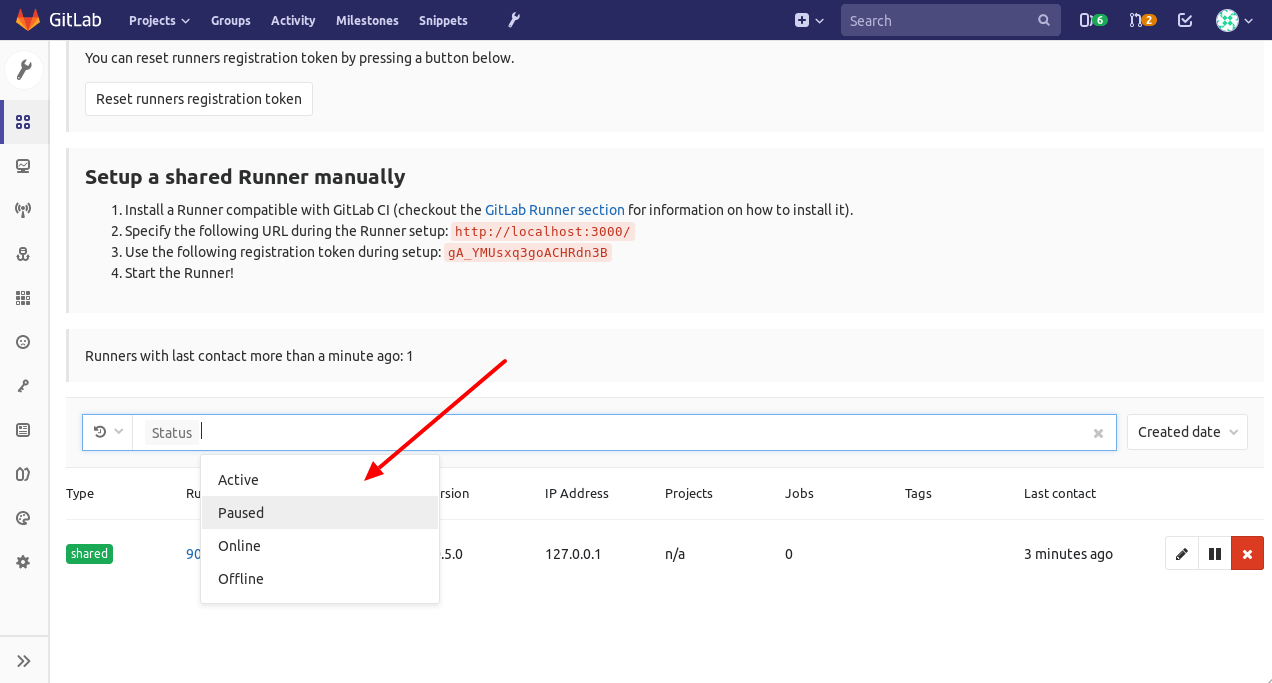
Docker interactive web terminal support
Available in: CORE, STARTER, PREMIUM, ULTIMATE
Functions of interactive web terminals have been expanded; now they are compatible with Docker implementers. Now the Docker session closes immediately after the script is completed, however, we are striving to further improve its work by solving problem # 3605 in our next version.

Skipping Auto DevOps Tasks based on feature availability
Available in: CORE, STARTER, PREMIUM, ULTIMATE, FREE, BRONZE, SILVER, GOLD
Starting at 11.4, Auto DevOps will evaluate the plan (GitLab.com) or the level (self-managed) of the instance in which it is running to determine which tasks to skip. Thus Auto DevOps will work faster if some functions are not used.
This not only saves your time, but also gives you the opportunity to more clearly observe the work of Auto DevOps, since you will only see the tasks necessary for your project.
Allow the process to schedule the execution of deferred tasks
Available in: CORE, STARTER, PREMIUM, ULTIMATE, FREE, BRONZE, SILVER, GOLD
Now you can perform tasks with a delay using the keyword whenc .gitlab-ci.yml. The timer starts counting from the moment when the task should have been started, thus giving you the opportunity to decide with what delay to perform tasks, if their execution needs to be postponed for a certain time, for example, when stepping up or to perform any other actions when A delay is required after performing another action.

Interactive Task List with Nurtch and JupyterHub
Available in: CORE, STARTER, PREMIUM, ULTIMATE, FREE, BRONZE, SILVER, GOLD
Interactive task lists provide operators with a powerful way to interact with various systems to perform basic tasks, such as diagnosing, deploying, and measuring infrastructure components.
The JupyterHub application, accessible through integration with Kubernetes GitLab, now includes the Rubix Nurtch library , which makes it easy to create DevOps task lists. We provide a sample task list that demonstrates common operations .
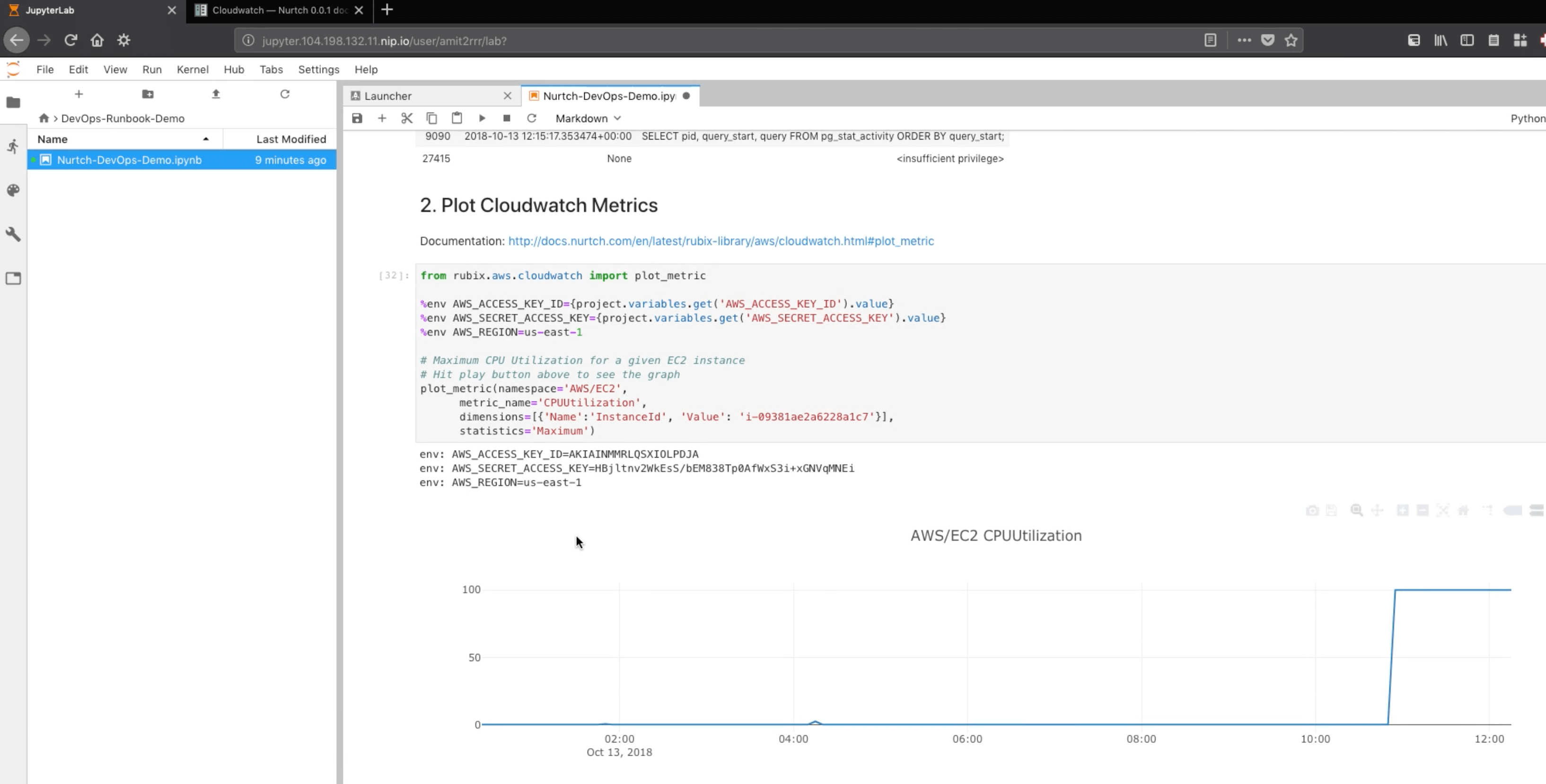
Adding entries to the license management guide
Available in: ULTIMATE, GOLD
The license management policy allows developers to decide whether to blacklist or approve a particular license for use in their project. This can be done immediately after adding a new license, directly on the merge request page. However, sometimes project developers are required to compile a list of licenses so that developers know if the changes made are consistent with the policy.
In GitLab 11.4, we added the ability to add records to manage licenses manually. Project developers can predefine the license usage policy on the Settings> CI / CD> License Management page , select the required licenses from the set of standard licenses, or add a unique entry to this list.

Extreme alert values are now displayed on the scoreboard
Available in: ULTIMATE, GOLD
In GitLab 11.4, extreme warning values are now displayed directly on the dashboard. This makes it easier to determine what warnings are generating at the moment, and to more clearly visualize the relationship between indicators and warnings.
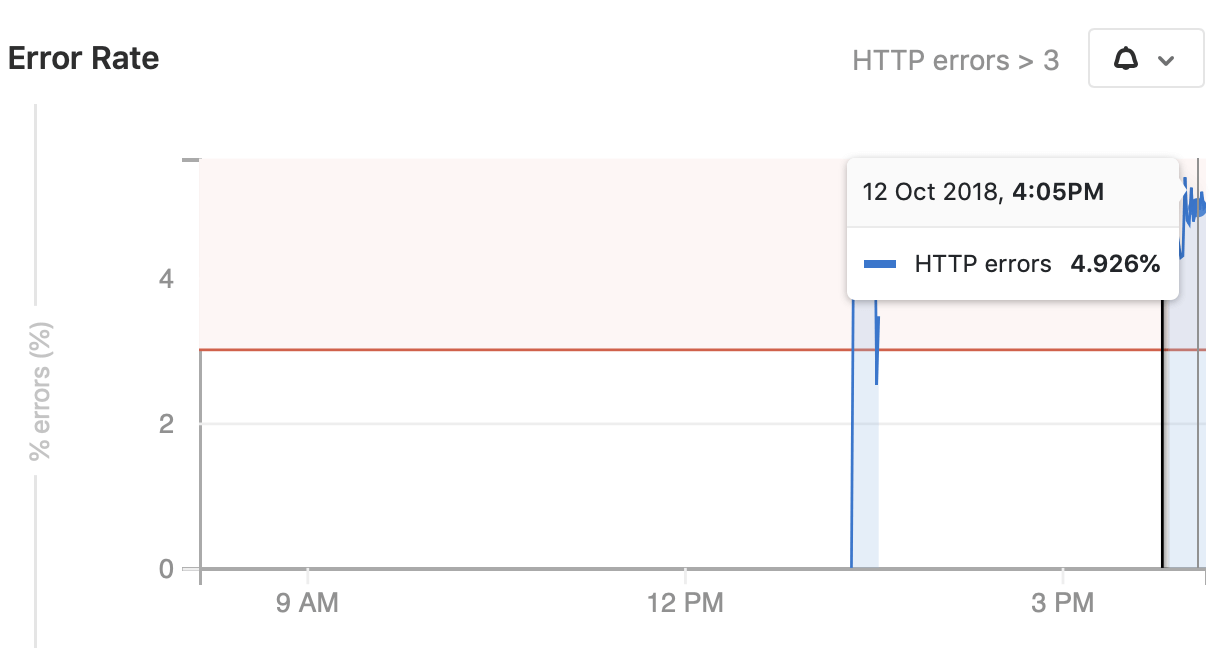
Git v2 protocol
Available in: CORE, STARTER, PREMIUM, ULTIMATE, FREE, BRONZE, SILVER, GOLD
To check if the current project branch is located beyond the remote branch, the developers extract the files from the links many times a day. Git v2 protocol is a significant upgrade of the Git wired protocol , which determines how cloning, extraction and transfer occurs between the client (your computer) and the server (GitLab). The new wired protocol improves the performance of the extraction command and makes future protocols more efficient.
Previously, responses to the extraction command included a list of all the links in the repository. For example, retrieving updates for a single branch (for example, git fetch origin master) also led to the download of a complete list of links. If the project is large, then this may mean downloading more than 100,000 links, i.e. 10 megabytes of data.
Git v2 protocol is supported in Git v2.18.0 by default. To run git config globally, you need to use git config --global protocol.version 2. Git v2 protocol does not work on GitLab.com via SSH yet, so it needs to be manually connected.
Geo UX update in the administrative region
Available in: PREMIUM, ULTIMATE
It is important for the Geo administrator to have an idea of the settings of additional nodes and the state of synchronization when working with remote commands.
In GitLab 11.4, the Geo administrative region settings have been improved, so now you can see even more details of the synchronization and verification settings in the interface. A new button “Open projects” has appeared in the main node, with which you can add a new quick link to go to the “Projects” list of the corresponding subordinate node. A new tab “All” has appeared in the subordinate nodes, which gives you a brief overview of the verification status of all projects.
Additional UX enhancements are now part of our process!
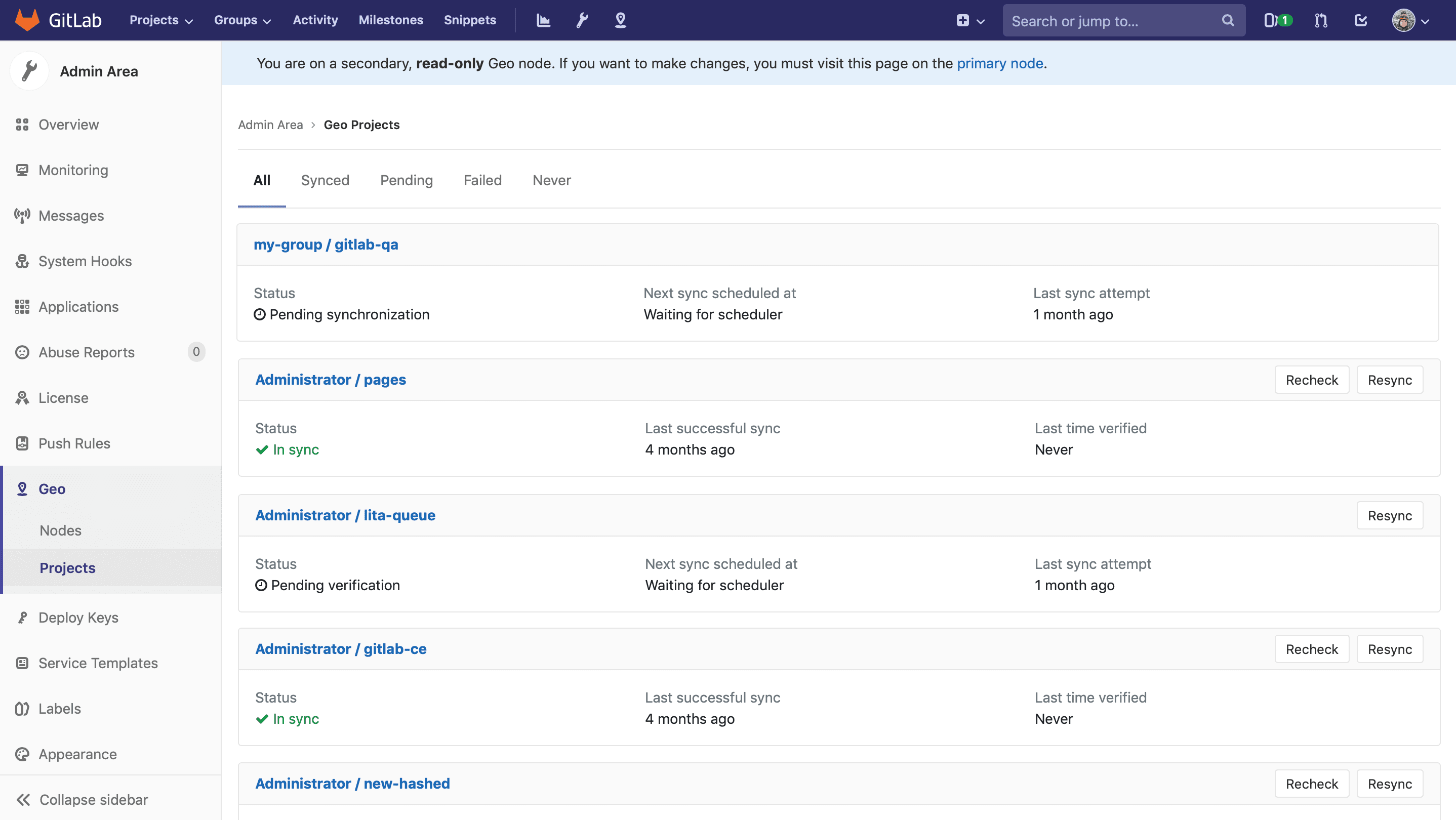
Prometheus 2.0 update for Omnibus GitLab
Available in: CORE, STARTER, PREMIUM, ULTIMATE
Omnibus GitLab is provided with Prometheus, making it easy to keep track of deployed instances . The Prometheus development team has released a new major update 2.x, in which a number of improvements have been made . This includes improved performance and a more convenient time series database format. Unfortunately, due to architectural changes in the database, the new database is no longer compatible with the old version 1.x.
Prometheus 2.4.2 is now available in GitLab 11.4 in the Omnibus package, so users can take advantage of it.
• In version 11.4 and newer versions, Prometheus 2 will be used.
• Existing versions will not be updated automatically. We have added a new command gitlab-ctl prometheus-upgrade, with which you can update Prometheus and, if necessary, transfer data . Prometheus will be stopped during data migration.
• In GitLab 12.0, Prometheus automatically upgrades to version 2.0 . With automatic updates, Prometheus 1.0 data will not be migrated.
For more information on updating Prometheus to version 2.4.2, check out our updated documentation .
Geo Improvements
Available in: PREMIUM, ULTIMATE
We are constantly trying to improve the features of Geo for remote teams. Significant Geo improvements in GitLab 11.4:
• Significant performance gains
• Link storage is included in checksum calculation
• Moving downloads to the object storage now also transfers local files
• Checking the storage of the primary node now always gives the correct checksum
• Reliable creation of the Sidekiq queue helps
Read the new post on our blog about how we made GitLab Geo .
Geo Enhancements for SSH Git Proxy Commands for Primary Site
Available in: PREMIUM, ULTIMATE, SILVER, GOLD
One of our ongoing tasks is to make Geo as easy to use as possible to facilitate the work of remote teams in GitLab. In version 11.3, we added support for SSH proxying git pushfrom slave nodes to the primary nodes.
In this release, we increased the performance of this feature and made it more convenient by adding the ability to clone and transfer to projects in a Geo script without having to create multiple configurations or manually update remote URLs.
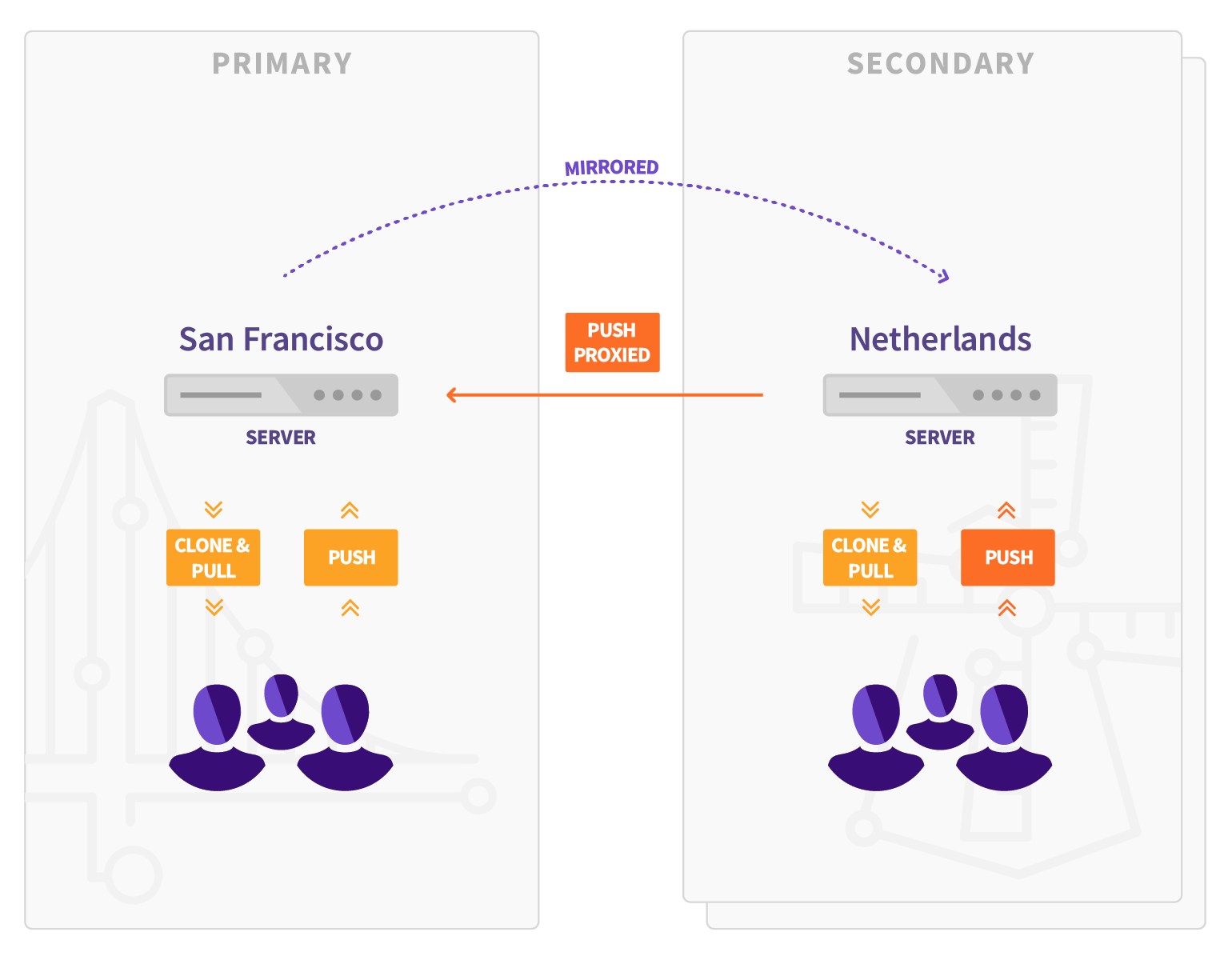
GitLab Runner 11.4
Available in: CORE, STARTER, PREMIUM, ULTIMATE, FREE, BRONZE, SILVER, GOLD
Today we also released GitLab Runner 11.4! GitLab Runner is an open source project that is used to run CI / CD jobs and send the results back to GitLab.
The most interesting changes:
• JSON logging support
• Dockers support for interactive web terminal
• Dockers support for web terminal support
• Ability to disable overwriting of entry point to docker
• Added display of parallel and limit values
• Added gitlab_runner_jobs_total command indicators
• Added a chart showing the duration of task execution
• Fix command and assignment of arguments when creating containers with K8S
A list of all changes can be found in the GitLab Runner change log: CHANGELOG
Increase in productivity
Available in: CORE, STARTER, PREMIUM, ULTIMATE, FREE, BRONZE, SILVER, GOLD
Major performance improvements for GitLab 11.4:
• Rendering Markdown with a large number of links to labels became faster
• Discussion of problems with a large number of links to different projects became faster
• Extraction of project branches related to the problem is performed using fewer queries
• Extraction environment for a join request is performed using a smaller number Requests
• A smaller number of requests are used to calculate the recipients of electronic notifications
• Faster creation of a new topic for a merge request
• Izv curing the “latest version” information in the tree structure creates fewer Gitaly queries
•Merge requests load faster after deleting non-executable code
Omnibus Improvements
Available in: CORE, STARTER, PREMIUM, ULTIMATE
• has redisbeen updated to version 3.2.1. This is a critical security update in which many vulnerabilities have been fixed. After upgrading to version 11.4, start gitlab-ctl restart redisto make sure that the new version is running.
• GitLab 11.4 includes the Mattermost 5.3 , which is an open source alternative to Slack . The latest version has added an advanced search on PCs and mobile devices, and much more. It also includes security updates, so we recommend installing it.
• has gitbeen updated to version 2.18.1, and libpng- to 1.6.35.
• has gnupgbeen updated to version 2.2.10, gpgmeto 1.10.0, libgcryptto 1.8.3,npthto 1.6, libgpg-errorto 1.32 and libassuanto 2.5.1.
• Now the certificates in the directory trusted_certsare installed as permission 0644, not 0755.
No longer supported
Docker Versions in GitLab Runner
In GitLab 11.4 (dated October 22, 2018), support for Docker versions prior to 1.12 (API version 1.24) was discontinued in accordance with the recommendations of the latest Docker version . In version 11.4 and higher, old versions will no longer be officially supported and may stop working at any time.
Date of deletion: October 22, 2018 .
Prometheus 1.x support in Omnibus GitLab
GitLab 11.4 (October 22, 2018) will no longer include the complete version of Prometheus 1.0 in Omnibus GitLab. From this point on, Prometheus 2.0 will be used , the indicator format of which is incompatible with version 1.0. Existing versions can be upgraded to 2.0 and, if necessary, transfer data using the built-in tool .
In GitLab version 12.0, Prometheus 2.0 will be automatically installed if the update has not yet been performed. Data from Prometheus 1.0 will not be transferred and will be lost.
Deletion Date: GitLab 12.0 Release
Update barometer
To go from GitLab version 11.3 to the latest version 11.4, you do not need to stop working. To upgrade without stopping work, refer to the documentation for the upgrade without downtime.
In this release, there is the option of migration, migration after deployment, and to help with large-scale migration, we added background migration.
The migration of GitLab.com took about 34 minutes, and the migration after deployment took about two minutes.
We recommend that GitLab Geo users refer to the Geo update documentation .
To ease the setup, Omniauth is now enabled by default . Since external vendors are not automatically configured, this should not affect installation in most cases. However, if you have already configured an external provider and have not enabled omniauth, it is activated when you upgrade to version 11.4. To prevent this from happening, you can either remove the provider from the settings, configuration, or turn off Omniauth manually .
List of changes
Refer to the list of changes to view all changes:
• GitLab Community Edition
• GitLab Enterprise Edition
• GitLab Runner
Installation
If you are setting up a new GitLab installation, see the GitLab download page .
Update
Check out our update page .
GitLab Subscription Plans
GitLab is available in two versions: self-managed and as a cloud service (SaaS) .
Self-Managed : Deploy locally or on your favorite cloud platform.
• Core : For small teams, personal projects or GitLab testing with unlimited time.
• Starter : For teams whose members are in the same place, engaged in a small number of projects that need professional support.
• Premium : For distributed teams that require advanced features, high availability and support in 24/7 mode.
• Ultimate : For businesses that want to align their strategy and project execution with enhanced security and compatibility requirements.
Cloud service SaaS - GitLab.com : supported, managed and administered by the GitLab team; possible free and paid subscription for individuals and teams.
• Free : Unlimited private repositories and an unlimited number of employees in the project. Private projects get access to Free features , open projects get access to Gold features .
• Bronze : For teams that need access to advanced workflow features.
• Silver : For teams that need more reliable DevOps capabilities, compatibility and faster support.
• Gold : Best suited for a large number of CI / CD conveyor jobs. Team members of each public project can use Gold features for free, regardless of their subscription plan.
